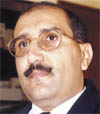Dr. Ibtihaj Al-Kamal: “Some pharmacies just appear or disappear overnight in Yemen.” [Archives:1998/21/Interview]
Dr. Ibtihaj Abdulqader Al-Kamal is a pharmacist and the publisher of the new bi-monthly, 20-page Al-Tabeeb or doctor magazine, the first edition of which to appear in June.
She graduated with a B.Sc. degree in pharmacy from Sanaa University in 1994, and started working in the marketing of medicines and medical and laboratory facilities and equipment. Dr. Ibtihaj also has two diplomas in computing and marketing.
Dr. Salah Haddash, Yemen Times Editing Manager, talked to Dr. Ibtihaj about various issues concerning the medicine market and the relevant official policies in Yemen. He filed the following interview. Excerpts:
Q: How have you benefited from your experience in marketing?
A: Marketing has added a lot to my professional experience, which I did not study at university. My success in this field has also made men respect the abilities of women.
Q: Are there many Yemeni female pharmacists?
A: They are not many, but their numbers are gradually increasing. Most of them are working as sales agents and representatives of drug companies.
I have not faced any difficulties in my work. It is as if medicine marketing is created for women.
Q: Are there any valuable scientific researches in pharmacy in Yemen?
A: There is no scientific research to speak of in Yemen. The official bodies concerned such as the Ministry of Health and the universities do not pay much attention to this field. This has made many medical and pharmacy graduates stop learning after finishing their university studies.
So we established the Tabeeb magazine to try through private initiative to further the cause of scientific research in this country. We aim to publish all the recent developments in this field so that doctors and pharmacists in Yemen can keep abreast of the rapid changes in their professions.
Q: How did you first get the idea to publish this magazine?
A: My colleague, Dr. Abdullah Al-Sunaidar and I were doing research on the effects of a particular new drug and were looking for more information. We tried looking in foreign magazines, which we found to be quite expensive and beyond the financial abilities of many Yemeni pharmacists and doctors.
So we hit upon the idea of publishing a specialized magazine that published the research done by Yemeni and international specialists. The magazine aims to concentrate on the diseases most prevalent in Yemen, which are sometimes different from other illnesses in other parts of the world.
Q: Shouldn’t the Pharmacists Syndicate publish such a scientific magazine?
A: The syndicate is supposed to do that, but it has not. Some people tried privately to publish such bulletins and magazines, but could not go on because of bad distribution or other problems. It took us some time to get the license to publish the magazine from the Ministry of Culture.
We hope to distribute Al-Tabeeb in all parts of Yemen. There are now more than 200 drug companies operating in Yemen and competing with each other. We hope to draw on their advertising and publicity campaigns. The magazine will be given to professional people free of charge.
Most of Al-Tabeeb articles are written by Yemeni pharmacists and doctors or re-printed by permission of other international publications. The magazine, published in Arabic and English, primarily aims to develop the academic level of Yemeni pharmacists and doctors.
Q: How do you evaluate the relationship between the doctor and the pharmacist in Yemen?
A: Doctors in Yemen do not like to be given any feedback or notes by the pharmacist. Doctors feel that they should have the first and final word, as far as prescribing medicines is concerned. Pharmacists, however, know more about drugs than doctors. Some doctors do consult with pharmacists as to the best suitable medicines.
If a doctor prescribes a certain medicine to the patient and the pharmacist gives the patient a similar drug with the same formula, the doctor usually resents this.
Q: Are there any opportunities of higher studies in pharmacy in Yemen?
A: Yes, there are but they are very limited. A small number – 5 or 6 – are admitted every year.
Q: Have you conducted any research?
A: Yes, I did a research in collaboration with other colleagues on the effects of qat on the absorption of antibiotics in the human body. We found the effect changes according to the case studied. But in general, we found that some drugs become less absorbed due to chewing qat.
Q: What do you think of pharmacies in Yemen?
A: Pharmacies in this country have become like grocery shops. They have mushroomed beyond control. The Ministry of Health says that it is now restricting the granting of pharmacy licenses. But in reality those who open pharmacies are really merchants. We as professionals find it quite difficult to open a pharmacy because of high rents. Although the Ministry of Health has stopped giving licenses for the last two years, some people still open new pharmacies.
In theory, a new graduate of pharmacy is entitled to open a new pharmacy without the condition of having experience or passing a special exam, as stipulated in other countries.
Q: What is the extent of drug smuggling into Yemen?
A: The Ministry of Health has just started to take notice of this issue. Medicines are smuggled from Saudi Arabia, Pakistan, India, Djibouti, etc. bout 10% of the drugs sold in Yemeni markets are smuggled from abroad. They are usually sold cheaply, and have not necessarily expired. The Ministry of Health is doing its best to combat medicine smuggling.
Q: Is there a distinct drug policy in Yemen?
A: Yes, there is now. In the past, it was very easy to establish a company to import drugs. The Ministry of Health is very strict in registering new drug-importing companies. A specialized Yemen committee must visit the drug factory abroad before giving the importation license. Some drug companies abroad give two different names so as to have two agents in Yemen, thus making unfair competition with other companies. The drug factory of which an agent requires an import license must also have an international quality certificate.
Unfortunately, the state does not subsidize medicines, particularly for some vulnerable groups such as mothers, children, the handicapped, etc. There should be some sort of health insurance system in Yemen.
Q: How is the quality of Yemeni medicines?
A: Prices are reasonable, but it is not very easy to evaluate the quality of medicines manufactured in Yemen. The laboratory which tests the quality of drugs produced in Yemen does the testing when the new drug is registered for the first time only. Every batch, produced or imported, must be tested for quality.
Q: What are the most common violations committed by pharmacists in Yemen?
A: The most common violation is opening a pharmacy without a license. Some pharmacies just appear or disappear overnight, which makes it quite tricky to deal with them as a marketing agent.
Also, there are marked differences in prices from one pharmacy to another. The Ministry of Health should try unify and fix prices.
Q: What are you plans for the future?
A: I hope to work in the Ministry of Health laboratories and specialize in drug quality control.
This way, I can practice what I learned at university.
——
[archive-e:21-v:1998-y:1998-d:1998-05-25-p:./1998/iss21/intrview.htm]


